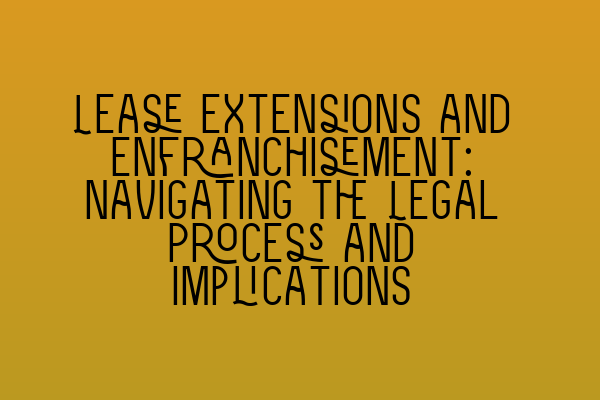Lease Extensions and Enfranchisement: Navigating the Legal Process and Implications
As property prices continue to soar, many homeowners are turning to lease extensions and enfranchisement as viable options to secure their property rights and protect their investments. In this blog post, we will delve into the intricacies of lease extensions and enfranchisement, guiding you through the legal process and discussing the implications involved.
What is a Lease Extension?
A lease extension is a legal process that allows leaseholders to extend the term of their lease beyond the original expiration date. This is typically done to maintain the value of the property and to address the potential issues arising from a short lease. While residential leasehold properties generally start with a long lease term (usually 99 or 125 years), the value of the leasehold diminishes as the term gets shorter.
Lease extensions are governed by the Leasehold Reform, Housing, and Urban Development Act 1993, which sets out the rights and procedures for leaseholders seeking an extension. The act provides leaseholders with the right to extend their lease by an additional 90 years once they have owned the property for at least two years. However, it’s important to note that leaseholders are required to pay a premium to the freeholder for the lease extension.
The Lease Extension Process
The process of extending a lease can be complex, involving various steps and legal requirements. Here’s a breakdown of the typical lease extension process:
1. Seek Professional Advice: Before initiating the lease extension process, it is crucial to seek professional advice from a solicitor who specializes in property law. They will guide you through the legalities and ensure you understand your rights and obligations.
2. Serve a Notice: Once you have obtained legal advice, you will need to serve a formal notice to the freeholder, informing them of your intention to extend the lease. This notice must comply with the statutory requirements and include specific information such as the proposed premium and terms of the extension.
3. Negotiations and Valuation: After serving the notice, negotiations will commence between you and the freeholder. It is common for the freeholder to appoint a surveyor to value the lease extension and determine the premium payable. It is crucial to have an experienced solicitor who can negotiate the best terms and ensure a fair valuation.
4. Agree on Terms: Once the negotiations are complete, and the terms have been agreed upon, a formal lease extension agreement will be drafted and executed by both parties. It is essential to have your solicitor review the agreement and ensure all the necessary clauses are included to safeguard your interests.
5. Registering the Lease Extension: After the lease extension agreement is signed, it must be registered with the Land Registry to ensure its legal validity and to update the property records.
Implications of Lease Extensions
Lease extensions offer numerous benefits to leaseholders, including:
1. Increased Property Value: Extending the lease can significantly increase the value of your property, making it more attractive to potential buyers should you decide to sell in the future.
2. Security and Stability: A longer lease provides reassurance, eliminating the risk of losing your home due to the lease expiring shortly.
3. Reduced Ground Rent: By extending the lease, you may have the opportunity to renegotiate the ground rent with the freeholder, potentially reducing the financial burden.
Enfranchisement: Another Option
Aside from lease extensions, enfranchisement is another avenue that leaseholders can explore to gain more control over their property. Enfranchisement allows leaseholders of flats to collectively purchase the freehold of the building or acquire the right to manage it through a process known as collective enfranchisement. Similarly, leaseholders of houses may have the right to acquire their freehold through individual enfranchisement.
Enfranchisement can provide greater control over the management and maintenance of the property, allowing leaseholders to make decisions collectively and potentially saving on service charges. However, enfranchisement can be a complex process, involving multiple parties and legal requirements. It is crucial to seek professional advice to ensure you navigate this process effectively.
Conclusion
Lease extensions and enfranchisement are legal processes that empower leaseholders to protect their property rights and investments in an ever-changing property landscape. Understanding the legal procedures involved, seeking professional advice, and having an experienced solicitor by your side will help you navigate the complexities and ensure you make informed decisions.
At SQE Property Law & Land Law, we have a team of solicitors specializing in property law who can provide you with expert advice and guidance on lease extensions, enfranchisement, and other property-related matters. Contact us today to schedule a consultation and explore your options.
Related Articles:
– SQE 1 Practice Exam Questions
– SQE 1 Practice Mocks FLK1 FLK2
– SQE 2 Preparation Courses
– SQE 1 Preparation Courses
– SRA SQE Exam Dates
